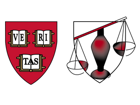Posts filed under 'video'
What ties together cheerleader outfits, monkey selfies, the Batmobile, a chicken sandwich, Yoga, and Yoda? In this talk, Professor Peter S. Menell — Koret Professor of Law at UC Berkeley School of Law and a Director of the Berkeley Center for Law & Technology — provides an exhilarating copyright year in review.

Also in ogg for download
More on this event here
April 19th, 2016
The relationship between burglary and architecture is far from abstract. While it is easy to focus merely on questions of how burglars use or abuse the built environment — looking for opportunities of illicit entrance — burglary, in fact, requires architecture. It is an explicitly spatial crime, one that cannot exist without a threshold to cross, without “the magic of four walls,” as at least one legal theorist has written.
In this talk Geoff Manaugh — author of the new book A Burglar’s Guide to the City, — discusses more than 2000 years’ worth of heists and break-ins, shedding light on everything from the complicated legal definition of an interior space, to the everyday tools burglars use to gain entry.

Also in ogg for download
More on this event here
April 18th, 2016
In October 2015, the European Court of Justice (CJEU) struck down the U.S./EU Safe Harbor agreement that enabled data to be freely transferred from Europe to the United States. In February 2016, the EU/U.S. Privacy Shield was proposed as a replacement. These developments demonstrate some of the ways the European Union’s far-reaching Right to be Forgotten (RTBF) is posing legal, economic, and cultural challenges for the U.S. and its EU trading partners.
In this talk Sanna Kulevska — who works on Internet law issues at the Legal Department of Google’s European Headquarters in Dublin — and Michael L. Rustad — author and Co-Director of the Intellectual Property Law Program at Suffolk University Law School — lead a discussion of the legal dilemmas that policymakers face in walking the tight rope between the Scylla of constraining the right of expression and the Charybdis of diminishing an individual’s right to control their personal data. The authors will use current case studies of takedown requests from Google to provide context for their discussion of how a Safe Harbor 2.0 might achieve the proper balance between expression and privacy.
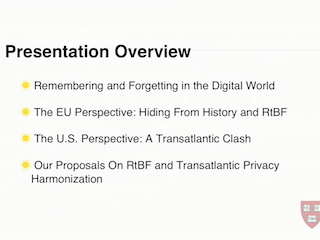
Also in ogg for download
More on this event here:
https://cyber.law.harvard.edu/node/99369
March 22nd, 2016
In 2013, the ACLU of Massachusetts set out to get a snapshot of student privacy policies in diverse communities statewide.
Almost across the board, schools told students they had “no expectation of privacy” on school networks, using school email, or on school devices.
The Supreme Court has said students don’t shed their constitutional rights at the schoolhouse gates. In this talk, Jessie Rossman and Kade Crockford from the ACLU of Massachusetts share the results of their study on student privacy policies, and ask whether students’ privacy rights can be protected on school grounds in the digital age.
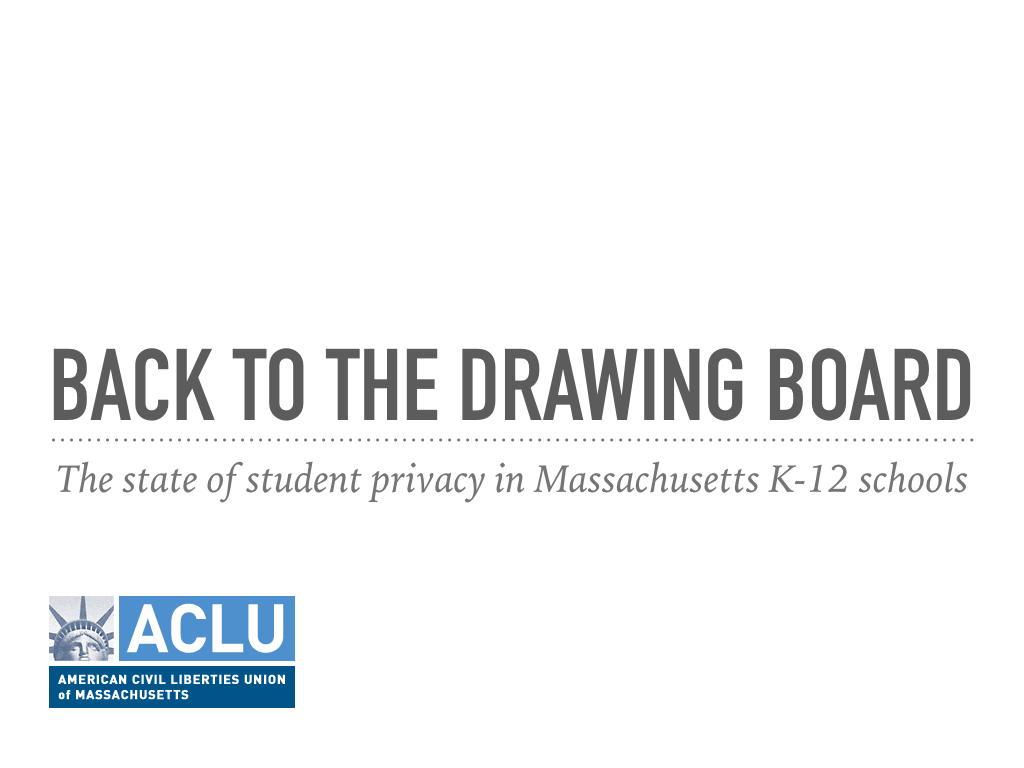
Also in ogg for download
More on this event here
March 15th, 2016
For four years running, the Director of National Intelligence’s Worldwide Threat Assessment to Congress has led with cyber threats to national and international security. Under statute, the several National Intelligence Officers constitute the most senior advisors of the US Intelligence Community in their areas of expertise.
In this discussion, Sean Kanuck — National Intelligence Officer (NIO) for Cyber Issues within the Office of the Director of National Intelligence and former senior analyst for the Central Intelligence Agency’s Information Operations Center — highlights the technology trends that are transforming cybersecurity and the future of intelligence. Assessing strategic developments in international relations and its implications for deterring malicious activity in cyberspace, his analysis focuses on the (in) applicability of existing arms control mechanisms and deterrence principles to modern information and communication technologies.
More on this event here

Also in ogg for download
March 10th, 2016
We’re on the cusp of the next wave of the web, where information will come to people, versus people seeking it out. This “big reverse” of the web poses all sorts of issues: ranging from policy, to personal privacy, to standardization across devices.
In this talk Dries Buytaert — open Source developer, and founder and project lead of Drupal — discusses what it will take to navigate a web that doesn’t look or feel anything like what we know today.

Also in ogg for download
More info on this event here
March 1st, 2016
Discrimination and harassment have been persistent problems since the earliest days of the social web. As platforms and legislators continue to debate and engineer responses, most of the burden of dealing with online discrimination and harassment has been borne by the online citizens who experience and respond to these problems.
How can everyday Internet citizens make sense of social problems online, including our own racist and sexist behavior? How can we support each other and cooperate towards change in meaningful, effective ways? And how can we know that our interventions are making a difference?
Nathan Matias — MIT PhD candidate and Berkman Fellow — shares four years of research and design interventions aimed at expanding the power of citizens to understand and develop effective responses to discrimination and harassment online.
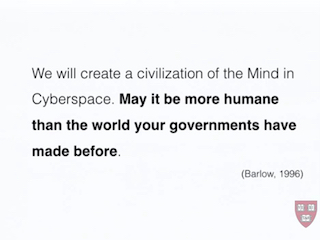
Also in ogg for download
More info on this event here.
February 26th, 2016
We’ve created a world where information technology permeates our economies, social interactions, and intimate selves. The combination of mobile, cloud computing, the Internet Things, persistent computing, and autonomy are resulting in something different. This World-Sized Web promises great benefits, but is also vulnerable to a host of new threats. Threats from users, criminals, corporations, and governments. Threats that can now result in physical damage and even death.
In this talk Bruce Schneier — author and internationally renowned security technologist — looks back at what we’ve learned from past attempts to secure these systems, and forward at what technologies, laws, regulations, economic incentives, and social norms we need to secure them in the future.
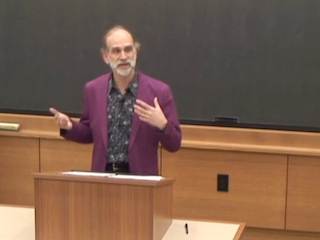
Also in ogg for download
More info on this event here
February 16th, 2016
Wikipedia, largely used as a synecdoche for open production generally, is a large, complex, distributed system that needs to solve a set of “open problems” efficiently in order to thrive. In this talk, I’ll use the metaphor of biology as a “living system” to discuss the relationship between subsystem efficiency and the overall health of Wikipedia. Specifically, I’ll describe Wikipedia’s quality control subsystem and some trade-offs that were made in order to make this system efficient through the introduction of subjective algorithms and human computation. Finally, I’ll use critiques waged by feminist HCI to argue for a new strategy for increasing the adaptive capacity of this subsystem and speak generally about improving the practice of applying subjective algorithms in social spaces. Live demo included!
About Aaron
Aaron Halfaker is an American computer scientist who is an employee of the Wikimedia Foundation. Halfaker earned a Ph.D. in computer science from the GroupLens research lab at the University of Minnesota in 2013. He is known for his research on Wikipedia and the decrease in the number of active editors of the site. He has said that Wikipedia began a “decline phase” around 2007 and has continued to decline since then. Halfaker has also studied automated accounts on Wikipedia, known as “bots”, and the way they affect new contributors to the site. He has developed a tool for Wikipedia editing called “Snuggle”, the goal of which is to eliminate vandalism and spam, and to also highlight constructive contributions by new editors. He has also built an artificial intelligence engine for Wikipedia to use to identify vandalism.
Links
These tell a story in order. The talk will cover a bit of each. Read from top to bottom and stop when you get bored or run out of time.
http://www-users.cs.umn.edu/~halfak/publications/The_Rise_and_Decline/halfaker13rise-preprint.pdf
http://www-users.cs.umn.edu/~halfak/publications/Snuggle/halfaker14snuggle-preprint.pdf
https://blog.wikimedia.org/2015/11/30/artificial-intelligence-x-ray-specs/
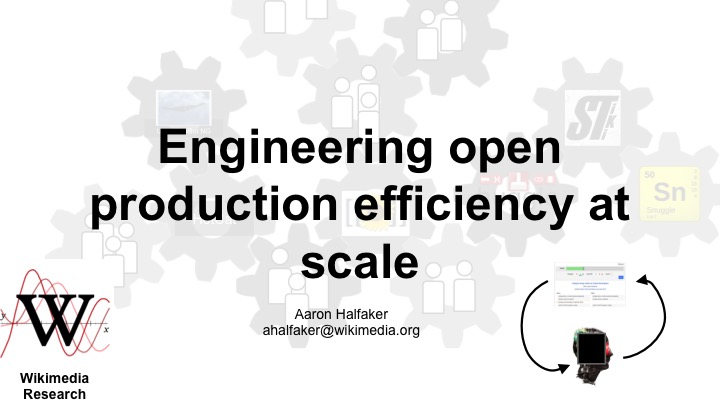
Also in ogg for download
More on this event here
February 2nd, 2016
Public Lab is an open community developing and using civic technologies to support the pursuance of community-defined questions and concerns. Public Lab introduces a model that incorporates open source R&D practices including transparent collaboration and iterative design, along with deliberative democratic governance, and practitioner empowerment through critical making. Community science can enable people to collect, interpret, and apply their own data to effect local change or participate in broader environmental research and decision-making.
We’ve conceptualized a tiered approach to project development, delineated by the scope of community objectives and the role of science in achieving those objectives. Examples of Public Lab projects from each tier demonstrate the versatility of community science, and the potential opportunity for it to facilitate public participation in environmental decision-making on multiple levels. In this session, we’ll discuss how participatory online communities can strategically support hyper-local goals and help to scale the ability for replicable change in how the public engages with decision-making processes.
About Shannon Dosemagen
A founder of Public Lab, Shannon is based in New Orleans and Cambridge (MA) as Executive Director of the non-profit. With a background in community organizing and education, Shannon has worked with environment and public health groups across the United States addressing declining freshwater resources, coastal land loss and building participatory monitoring programs with communities neighboring industrial oil facilities and impacted by the BP oil spill. In her current work with Public Lab, Shannon seeks to infuse traditional organizing methods of the environmental sector with new media technologies and tools to create actionable outcomes.
She has a MS in Anthropology and Nonprofit Management and has worked with nonprofits for over fifteen years. She is an Ashoka Fellow, a Senior Fellow of the Environmental Leadership Program a recipient of the Claneil Foundation Emerging Leaders Fund and a past Loyola University Institute for Environmental Communications Fellow. Shannon serves on advisory boards, councils or committees for the National Parks Conservation Association, World Economic Forum, Citizen Science Association, the Louisiana Public Health Institute Healthy Communities Coalition, and the Louisiana Bar Association.
About Public Lab
Public Lab is a community where you can learn how to investigate environmental concerns. Using inexpensive DIY techniques, we seek to change how people see the world in environmental, social, and political terms.

Also in ogg for download
More on this event here
January 26th, 2016
Next Posts
Previous Posts










